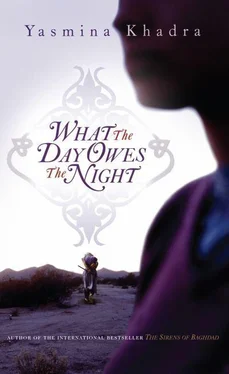‘You’ll like it here,’ my uncle promised as he greeted Germaine and me on the steps of our new home.
The majority of the inhabitants of Río Salado were Spaniards and Jews, who were fiercely proud of having built their houses with their bare hands, of having snatched from this dry, pitted land sweet grapes that would have delighted even the gods of Olympus. They were friendly, impulsive people who would shout across the street to one other, hands cupped like megaphones. They knew each other so well that it was as if they had all been cast from the same mould. It was utterly unlike Oran, where to go from one neighbourhood to another was like moving between centuries, between different planets. Río Salado was easygoing and broad-minded; even the church, which stood next to the town hall, was set back from the square so as not to disturb revellers.
My uncle was right. Río Salado was the perfect place to start afresh. We lived on a hill to the east of the village in a large, bright, airy house set in magnificent gardens and with a small balcony that overlooked a sea of vineyards. The ground floor had been converted into a pharmacy, with a small back office lined with shelves and compartments. A spiral staircase led to the first-floor living room, off which were three large bedrooms and a tiled bathroom with an iron bathtub with claw feet in the shape of lion’s paws cast in bronze. I felt at home here from the moment I first stood on the sunlit balcony watching a partridge soar above the vineyards, and felt myself soar with it.
I was overjoyed. Having been born in the countryside, here in Río Salado I rediscovered the familiar sights and smells of my childhood, the smell of the newly ploughed earth, the silent hills. I was a farmer’s son again, happy to discover that the city clothes I had been forced to wear for so long had not warped my soul. The city was an illusion, the countryside a joy that was constantly renewed, a place where day breaks like the dawn of the world, where nightfall brings with it perfect peace. From the first, I loved Río Salado. It was a blessed place and I could easily imagine gods and titans finding rest here. It was a place of serenity, undisturbed by primordial demons. Even when the jackals came at night to prowl the sleeping town, I felt like going with them, following them into deep forest. Sometimes I would go out on to the balcony to watch them, sly shadows slinking through the vineyards; I could stand there for hours listening for every hushed sound, gazing at the moon, which dipped and seemed to brush my eyelashes.
And then there was Émilie.
The first time I saw her, she was sitting on the porch outside the pharmacy, toying with the laces of her boots. She was a pretty girl with timorous coal-black eyes. I could have mistaken her for an angel were it not that her face, so white it looked like marble, bore the unmistakable sign of some terrible illness.
‘Hello,’ I said. ‘Can I help you?’
‘I’m waiting for my father,’ she said, shifting to one side to let me pass.
‘You can wait inside. It’s freezing out here.’
She shook her head.
When I saw her some days later she was with her father, a hulking man who looked as though he had been carved from a menhir. He waited by the counter, silent and motionless, as Germaine led the girl into the back office. When they reappeared some minutes later, the man set some money on the counter, took his daughter by the hand and left.
‘What was she here for?’ I asked Germaine.
‘Her injection . . . I give it to her every Wednesday.’
‘Is it serious . . . what she’s got?’
‘Only God can know that.’
The following Wednesday, I hurried home from school so I could see her. She was sitting on a bench opposite the counter, leafing through a book.
‘What are you reading?’
‘It’s a book about Guadeloupe.’
‘What’s Guadeloupe?’
‘It’s a French island in the Caribbean.’
I tiptoed closer, afraid that I might startle her – she looked so fragile.
‘My name is Younes.’
‘Mine’s Émilie.’
‘I’ll be thirteen in three weeks.’
‘I was nine last November.’
‘Are you in a lot of pain?’
‘It’s not too bad.’
‘What’s wrong with you?’
‘I don’t know. The doctors at the hospital couldn’t work it out, and the medicine they’re giving me doesn’t seem to do any good.’
Germaine appeared and Émilie went with her, leaving the book on the bench. There was a rose bush in a pot on the sideboard. I picked a rose and slipped it between the pages of the book, then went up to my room.
When I came down again, Émilie was gone.
She did not come for her injection the following Wednesday, nor the Wednesday after that.
‘She must be in hospital,’ Germaine said.
After several weeks, I gave up all hope of seeing Émilie again.
Then I met Isabelle. She was the niece of Pépé Rucillio – the richest man in Río Salado. Isabelle was a pretty little girl with big periwinkle-blue eyes and long hair that cascaded down her back. She thought of herself as sophisticated. She looked down her nose at everything and everyone, but when she looked at me, she suddenly seemed thin and frail. Isabelle wanted me all to herself and woe betide anyone who came too close to me.
Isabelle’s parents – successful wine merchants – worked for Pépé Rucillio, the patriarch of the village. They lived in a huge villa on a street cascading with bougainvilleas near the Jewish cemetery.
Isabelle’s mother was a highly strung French woman whose family, people said, were penniless aristocrats (though she was quick to remind everyone that she had blue blood in her veins). Isabelle had inherited little from her mother except her obsession with order and discipline, but she owed much to her father, a handsome olive-skinned man from Catalonia. She had his face – the same high cheekbones, the chiselled mouth, the piercing eyes. Even at the tender age of thirteen, with her aristocratic nose and her regal manner, Isabelle knew what she wanted and how to get it. She was as careful about the company she kept and the image she projected of herself. In a previous life, she told me, she had been a chatelaine.
It was Isabelle who approached me. I was at some festival on the village square when she came over to me and asked: ‘Are you Monsieur Jonas?’ She addressed everyone, young and old, as monsieur or madame, and insisted they do the same to her. ‘Thursday is my birthday,’ she went on imperiously, not waiting for me to answer. ‘You are cordially invited to attend.’ I didn’t know whether this was an invitation or a command. When I arrived at her party on Thursday, feeling somewhat lost in the confusion of her cousins and her friends, she grabbed me and introduced me to everyone: ‘This is my best friend.’
My first kiss, I owe to Isabelle. We were in an alcove of the grand drawing room at her house. Isabelle, her back straight, her chin held high, was playing the piano. I was sitting next to her, watching her slender fingers flutter over the keys. Suddenly she stopped, closed the piano lid carefully and, after a moment’s hesitation – or a moment’s thought – turned to me, took my face in her hands and pressed her lips to mine, closing her eyes in mock passion.
The kiss seemed to go on for ever.
Isabelle opened her eyes again before she pulled away.
‘Did you feel anything, Monsieur Jonas?’
‘No,’ I said.
‘Me neither. It’s strange, in the movies, it looks so sophisticated . . . Perhaps you have to be grown up to really feel these things.’
She looked deep into my eyes and announced: ‘Never mind. We’ll wait as long as it takes.’
Isabelle had the patience of those who believe that tomorrow belongs to them. I was the most handsome boy on earth, she told me, and in some previous life I must have been a prince. She informed me that she had chosen me to be her fiancé because I was ‘worth the candle.’
Читать дальше












